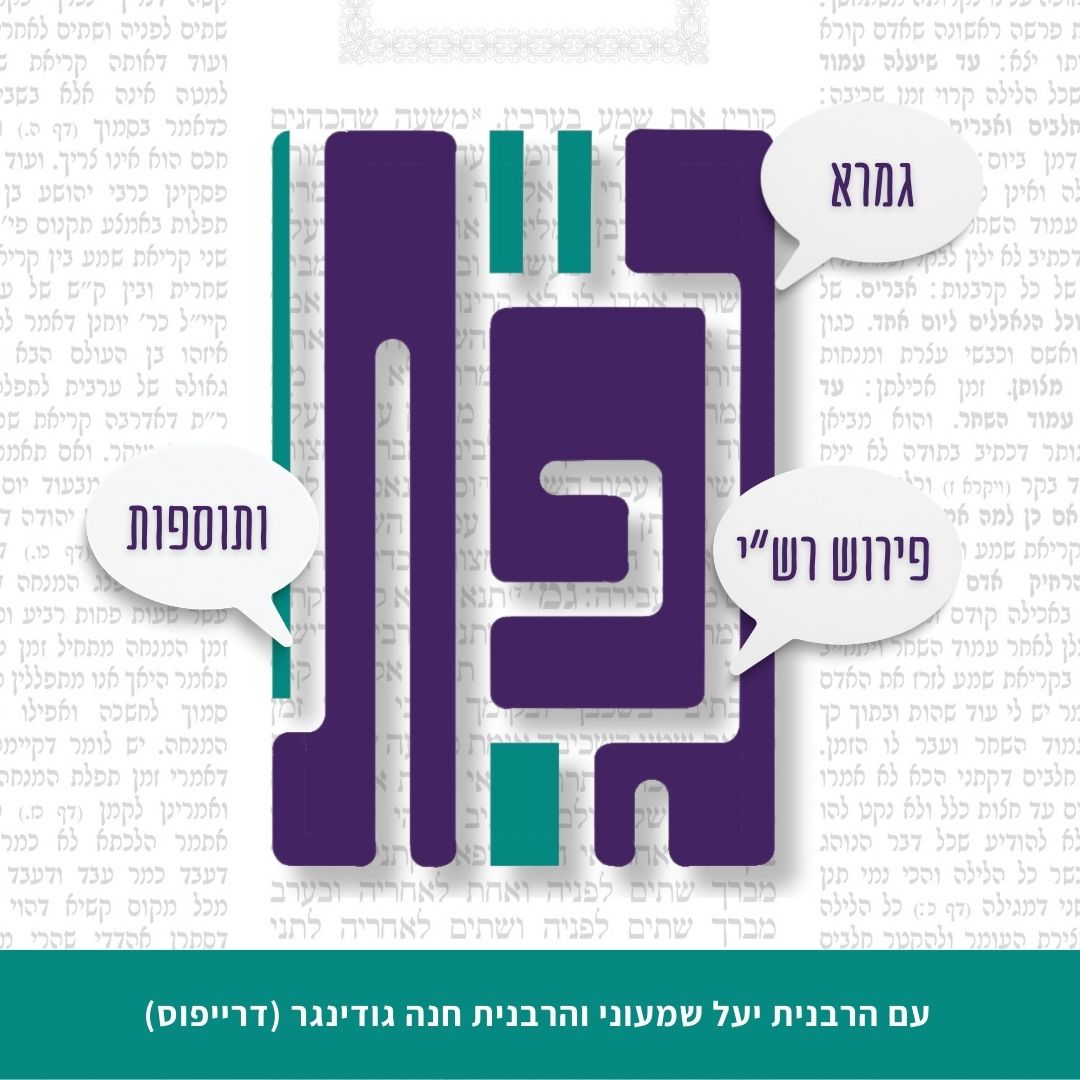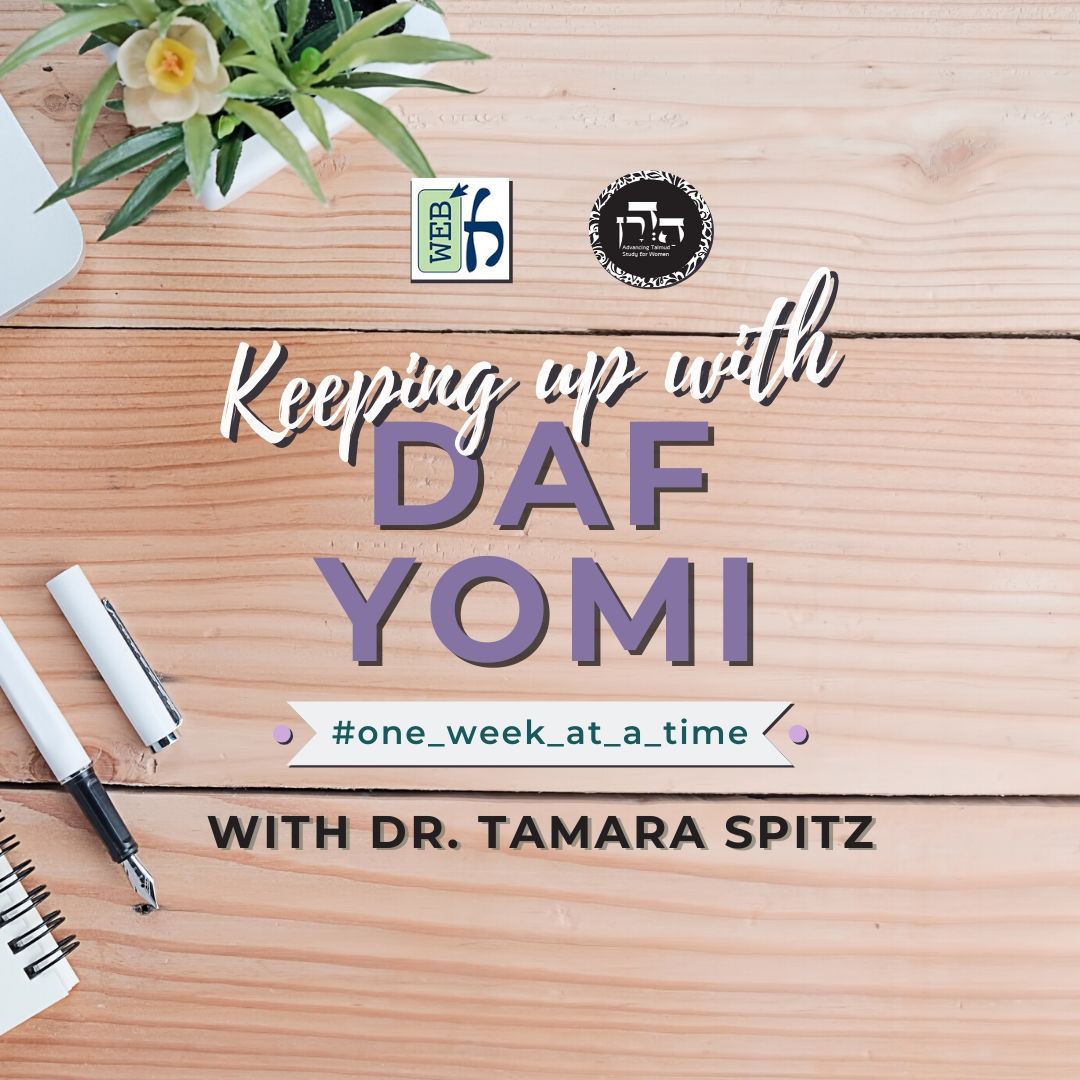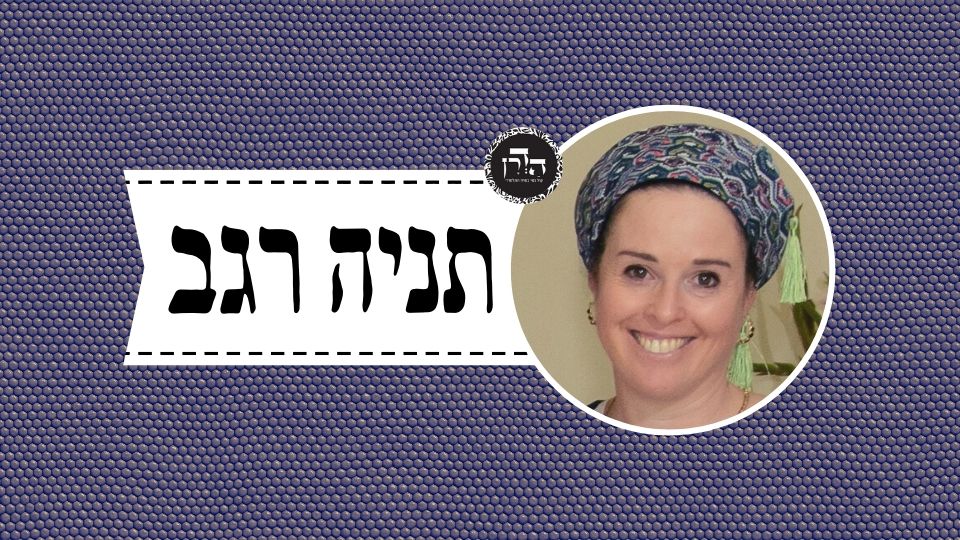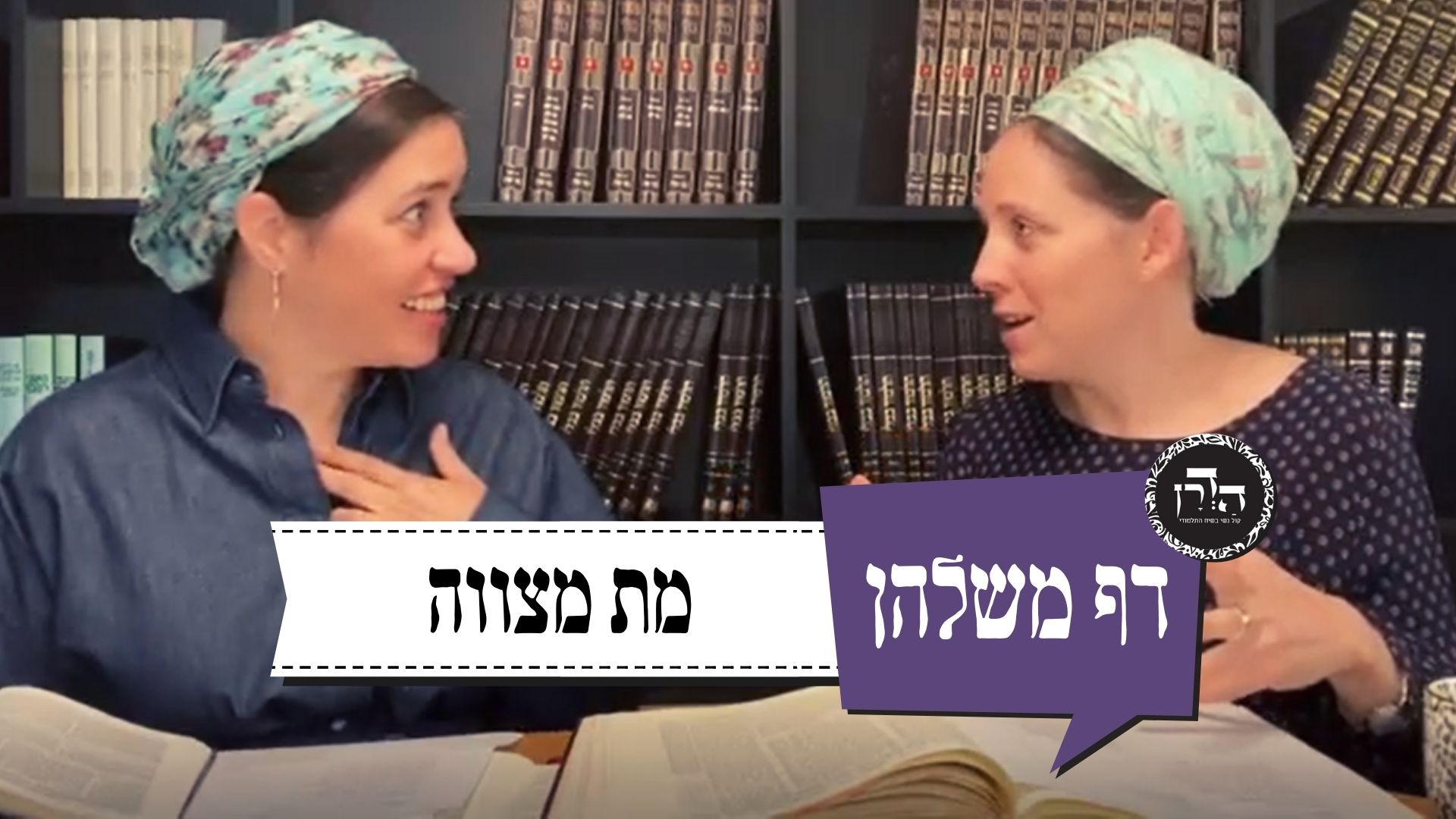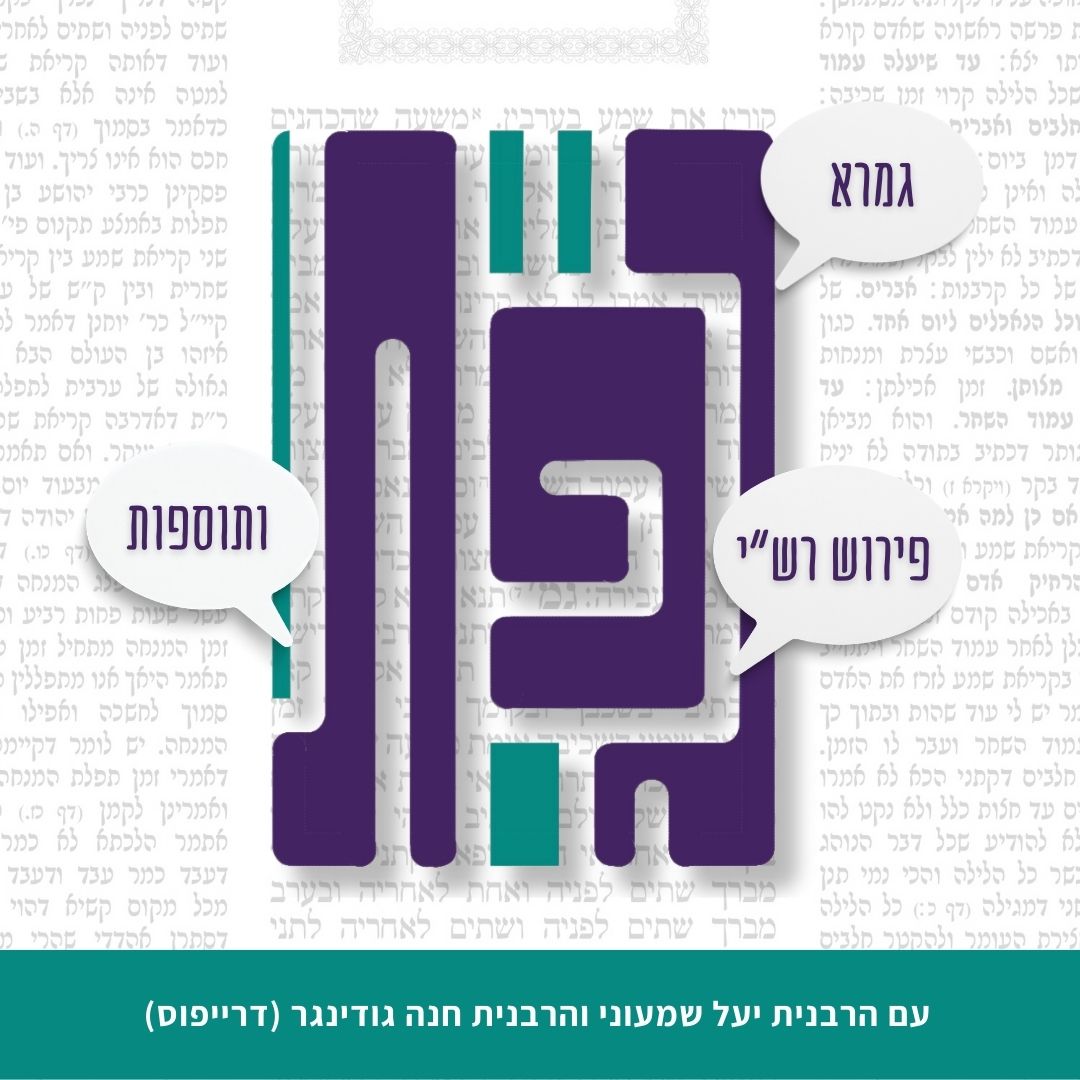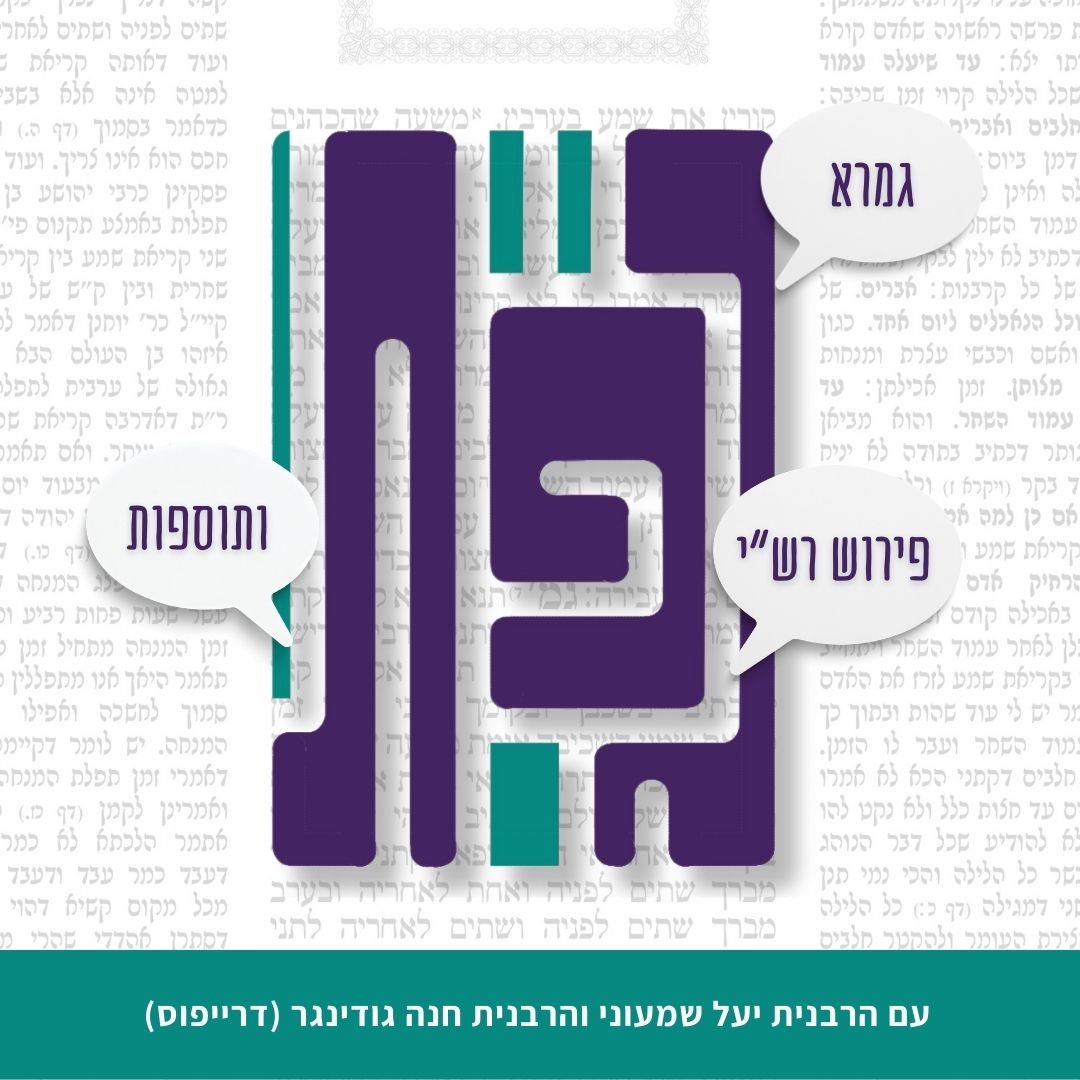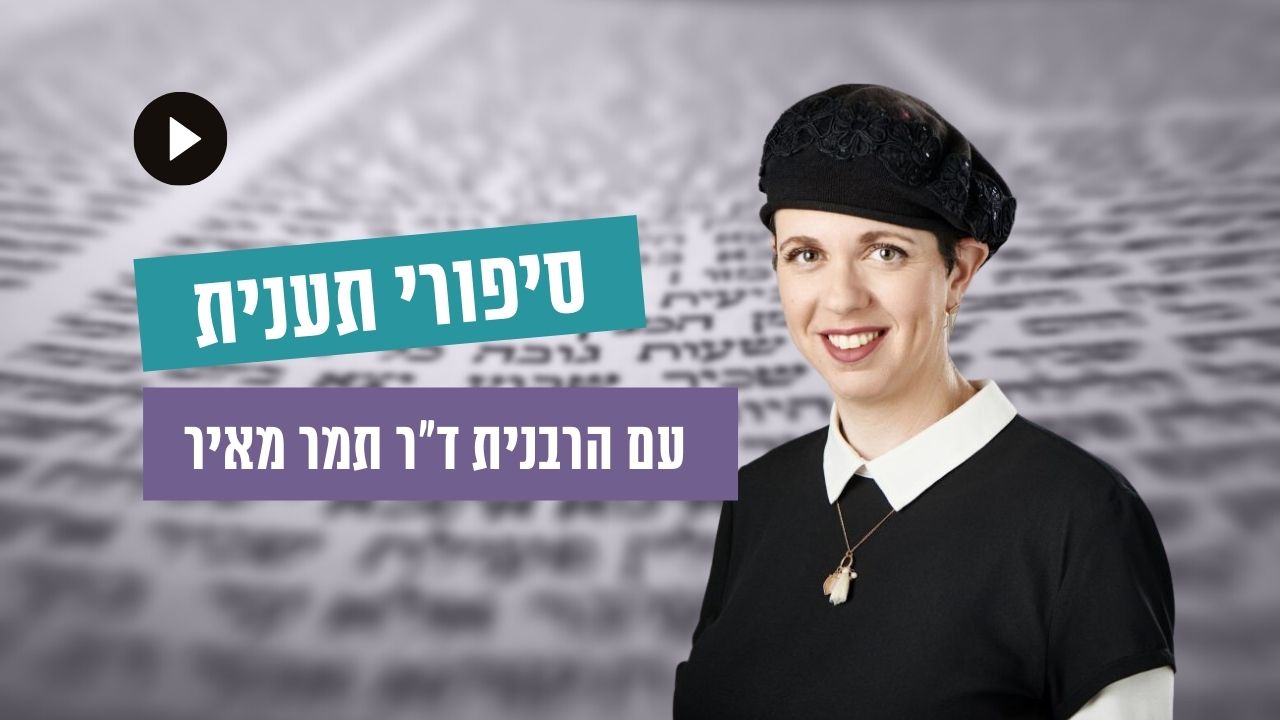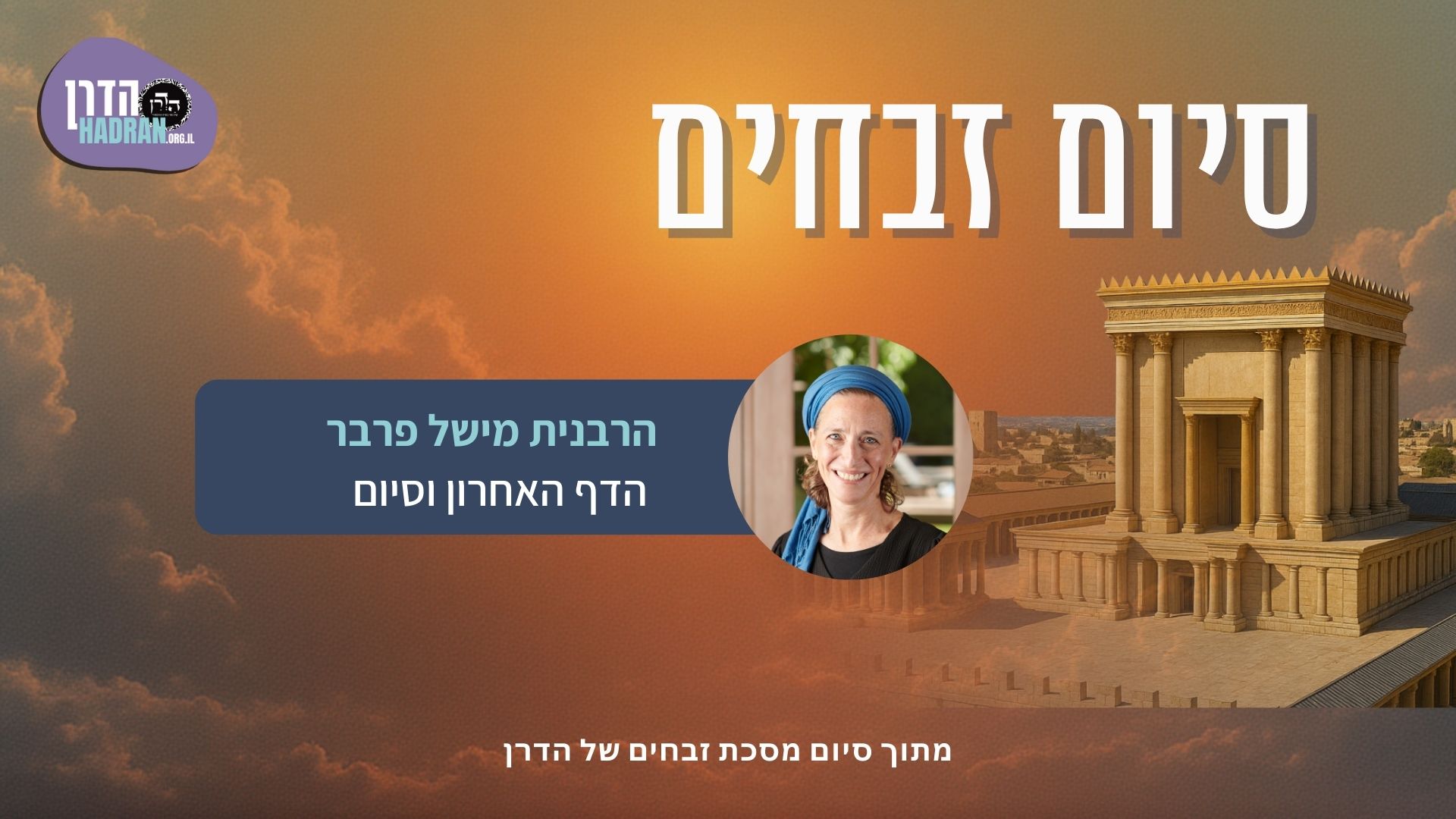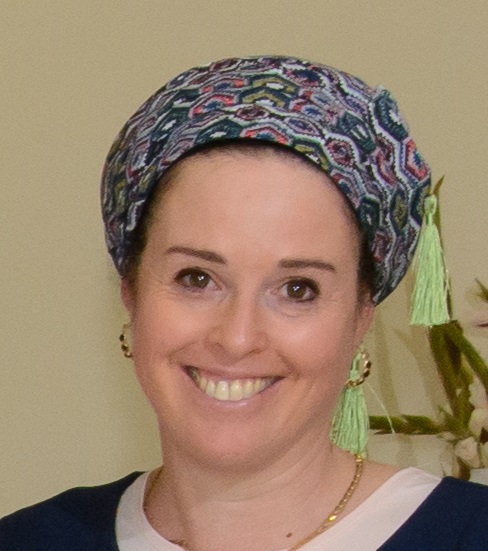כדאי לאדם לעסוק באומנות אבותיו. מה נחשב יסורין ומה המשמעות של זה? האם הדור הולך אחר המנהיג או המנהיג הולך אחר הדור? הפטור לעני של הישג יד הולך אחר הנודר. המשנה משווה בין זה לדין של קרבנות מצורע עני במקרה שמישהו נודר שיביא קרבנותיו במקומו. האם הם שונים או לא? מי שהיה עני בשעת שאמר "ערכי עלי” ואז העשיר או ליהפך – האם דנים בו כעני או לא? האם זה אותו דבר בקשר למצורע?
רוצה להקדיש שיעור?
כלים
העמקה
רוצה להבין מה באמת קורה מתחת לפני השטח של הסוגיה?
שיעורים, פודקאסטים והרחבות של מיטב המורות שלנו יפתחו לך עוד זוויות וכיווני חשיבה.
חדשה בלימוד הגמרא?
זה הדף הראשון שלך? איזו התרגשות עצומה! יש לנו בדיוק את התכנים והכלים שיעזרו לך לעשות את הצעדים הראשונים ללמידה בקצב וברמה שלך, כך תוכלי להרגיש בנוח גם בתוך הסוגיות המורכבות ומאתגרות.
פסיפס הלומדות שלנו
גלי את קהילת הלומדות שלנו, מגוון נשים, רקעים וסיפורים. כולן חלק מתנועה ומסע מרגש ועוצמתי.
ערכין יז
פּוּרְעָנוּת מִזְדַּמֶּנֶת לוֹ.
A calamity awaits him.
תַּנְיָא, רַבִּי אֱלִיעֶזֶר הַגָּדוֹל אוֹמֵר: אִלְמָלֵא בָּא הַקָּדוֹשׁ בָּרוּךְ הוּא עִם אַבְרָהָם יִצְחָק וְיַעֲקֹב בְּדִין, אֵין יְכוֹלִין לַעֲמוֹד מִפְּנֵי תּוֹכֵחָה, שֶׁנֶּאֱמַר: ״וְעַתָּה הִתְיַצְּבוּ וְאִשָּׁפְטָה אִתְּכֶם לִפְנֵי ה׳ אֵת כׇּל צִדְקוֹת ה׳ אֲשֶׁר עָשָׂה אִתְּכֶם וְאֶת אֲבוֹתֵיכֶם״.
§ The Gemara returns to the topic of rebuke. It is taught in a baraita that Rabbi Eliezer the Great says: Were the Holy One, Blessed be He, to have entered into judgment with Abraham, Isaac and Jacob, they would not have been able to stand before the rebuke. As it is stated: “Now therefore stand still, that I may plead with you before the Lord concerning all the righteous acts of the Lord, which He did to you and to your fathers” (I Samuel 12:7). This indicates that God acted towards the patriarchs with righteousness, i.e., mercy, not as they deserved according to the strict letter of the law.
״זֶה דּוֹר דֹּרְשָׁיו מְבַקְשֵׁי פָנֶיךָ יַעֲקֹב סֶלָה״, פְּלִיגִי בַּהּ רַבִּי יְהוּדָה נְשִׂיאָה וְרַבָּנַן, חַד אָמַר: דּוֹר לְפִי פַּרְנָס, וְחַד אָמַר: פַּרְנָס לְפִי דוֹרוֹ.
§ The verse states: “This is the generation of them that seek after Him, that seek Your face, Jacob. Selah” (Psalms 24:6). This verse teaches that the level of the generation and those who lead them, i.e., those who seek after Him, are the same. Rabbi Yehuda Nesia and the Rabbis disagree about this. One says: The level of the generation follows the level of the leader, and one says: The level of the leader follows the level of his generation.
לְמַאי הִלְכְתָא? אִילֵּימָא לִמְעַלְּיוּתָא, דְּמָר סָבַר: אִי מְעַלֵּי דָּרָא מְעַלֵּי פַּרְנָס, וּמָר סָבַר: אִי מְעַלֵּי פַּרְנָס מְעַלֵּי דָּרָא — הָא אִיכָּא צִדְקִיָּה, דַּהֲוָה מְעַלֵּי וְדָרֵיהּ לָא הֲוָה מְעַלֵּי, וְהָא יְהוֹיָקִים, דְּלָא הֲוָה מְעַלֵּי וְדָרֵיהּ הֲוָה מְעַלֵּי!
The Gemara asks: With regard to what halakha, i.e., matter, is this stated? If we say for good, that one Sage holds that if the generation is good then their leader will be good, and one Sage holds that if the leader is good then his generation will be good, this cannot be correct, as there is the case of King Zedekiah, who was good, but his generation was not good. And conversely, there is the case of Jehoiakim who was not good, but his generation was good.
דְּאָמַר רַבִּי יוֹחָנָן מִשּׁוּם רַבִּי שִׁמְעוֹן בֶּן יוֹחַי: מַאי דִּכְתִיב ״בְּרֵאשִׁית מַמְלְכוּת יְהוֹיָקִים מֶלֶךְ יְהוּדָה״?
The Gemara cites proof for these claims. As Rabbi Yoḥanan says in the name of Rabbi Shimon ben Yoḥai: What is the meaning of that which is written: “In the beginning of the reign of Jehoiakim, son of Josiah, king of Judah, came this word from the Lord, saying” (Jeremiah 26:1), and similarly with regard to Zedekiah the verse states: “And it came to pass the same year, in the beginning of the reign of Zedekiah, king of Judah, in the fourth year, in the fifth month, that Hananiah, son of Azzur, the prophet, who was of Gibeon, spoke to me in the house of the Lord, in the presence of the priests and of all the people, saying” (Jeremiah 28:1). Why did the prophet use the term “in the beginning” exclusively with regard to these two kings, as opposed to: During the first year of his reign, or a similar formulation?
בִּיקֵּשׁ הַקָּדוֹשׁ בָּרוּךְ הוּא לְהַחֲזִיר אֶת הָעוֹלָם לְתוֹהוּ וָבֹהוּ בִּשְׁבִיל יְהוֹיָקִים, כֵּיוָן שֶׁנִּסְתַּכֵּל בְּדוֹרוֹ נִתְיַישְּׁבָה דַּעְתּוֹ. בִּיקֵּשׁ הַקָּדוֹשׁ בָּרוּךְ הוּא לְהַחְזִיר אֶת הָעוֹלָם לְתוֹהוּ וָבֹהוּ מִפְּנֵי דּוֹרוֹ שֶׁל צִדְקִיָּהוּ, כֵּיוָן שֶׁנִּסְתַּכֵּל בְּצִדְקִיָּהוּ נִתְיַישְּׁבָה דַּעְתּוֹ.
This term teaches that the Holy One, Blessed be He, sought to revert the world to chaos and void, as it was in the beginning before Creation (Genesis 1:1–2), on account of Jehoiakim, who did evil in the eyes of God. Once He observed the people of his generation, His mind was settled. Likewise, the Holy One, Blessed be He, sought to revert the world to chaos and void, on account of the generation of Zedekiah, but once He observed Zedekiah, His mind was settled. This shows that the leader and his generation are not necessarily on the same level in terms of righteousness.
אֶלָּא לְעִנְיַן תּוּקְפָּא וְנִיחוּתָא קָאָמְרִינַן.
The Gemara answers: Rather, we are speaking in terms of harshness and gentleness. One Sage holds that if the leader is harsh, then the generation will be harsh. If the leader is gentle and kind, the generation will be the same. The other Sage holds that if the people of a certain generation are harsh, they will have a harsh leader; if the generation is gentle and kind, the leader will be similar.
הֲדַרַן עֲלָךְ יֵשׁ בַּעֲרָכִין.
מַתְנִי׳ הֶשֵּׂג יָד בַּנּוֹדֵר, וְהַשָּׁנִים בַּנִּידָּר, וְהָעֲרָכִין בַּנֶּעֱרָךְ, וְהָעֵרֶךְ בִּזְמַן הָעֵרֶךְ.
MISHNA: Affordability, which is written in the Torah: “According to the means of him who vowed shall the priest valuate him” (Leviticus 27:8), is determined in accordance with the means of the one taking the vow, and the sum fixed by the Torah based on the years of age is in accordance with the age of the subject of the vow. And the distinction based on sex that is written in the halakhot of valuations is stated with regard to the one valuated, and the different valuation based on the age of the one valuated is determined at the time one takes the vow of valuation.
הֶשֵּׂג יָד בַּנּוֹדֵר, כֵּיצַד? עָנִי שֶׁהֶעֱרִיךְ אֶת הֶעָשִׁיר — נוֹתֵן עֵרֶךְ עָנִי, וְעָשִׁיר שֶׁהֶעֱרִיךְ אֶת הֶעָנִי — נוֹתֵן עֵרֶךְ עָשִׁיר.
The mishna elaborates: Affordability is in accordance with the means of the one taking the vow; how so? A destitute person who valuated a wealthy person gives the valuation in accordance with the means of a destitute person, as determined by the priest. And a wealthy person who valuated a destitute person gives the valuation in accordance with the means of a wealthy person, the sum of which is fixed in the Torah.
אֲבָל בַּקׇּרְבָּנוֹת אֵינוֹ כֵּן, הֲרֵי שֶׁאָמַר: ״קׇרְבָּנוֹ שֶׁל מְצוֹרָע זֶה עָלַי״, הָיָה מְצוֹרָע עָנִי — מֵבִיא קׇרְבַּן עָנִי, עָשִׁיר — מֵבִיא קׇרְבַּן עָשִׁיר.
But with regard to offerings that is not so, as one who took a vow and said: It is incumbent upon me to provide the offering of this leper, to a leper who requires it for his purification; if the one undergoing purification was a destitute leper, the one who took the vow brings the offering of a destitute leper, which is one male sheep, a tenth of an ephah of fine flour, and two doves or two pigeons (see Leviticus 14:21–22). If the one undergoing purification was a wealthy leper, the one who took the vow brings the offering of a wealthy leper, which is two male sheep, a ewe, and three-tenths of a ephah of fine flour (see Leviticus 14:10).
רַבִּי אוֹמֵר, אוֹמֵר אֲנִי: אַף בָּעֲרָכִין כֵּן, וְכִי מִפְּנֵי מָה עָנִי שֶׁהֶעֱרִיךְ אֶת הֶעָשִׁיר נוֹתֵן עֵרֶךְ עָנִי, שֶׁאֵין הֶעָשִׁיר חַיָּיב כְּלוּם. אֲבָל עָשִׁיר שֶׁאָמַר: ״עֶרְכִּי עָלַי״, וְשָׁמַע עָנִי וְאָמַר: ״מַה שֶּׁאָמַר זֶה עָלַי״ — נוֹתֵן עֵרֶךְ עָשִׁיר.
Rabbi Yehuda HaNasi says: I say: Even with regard to valuations it is so. He explains: For what reason does a destitute person who valuated a wealthy person give the valuation in accordance with the means of a destitute person? It is due to the fact that the wealthy person is not obligated to pay anything, as the debt was generated by the destitute person who vowed to donate the valuation of a wealthy individual. But in a case similar to that of the offerings of a leper, in the case of a wealthy person who said: It is incumbent upon me to donate my valuation, and a destitute person heard him and said: It is incumbent upon me to donate that which he said, the destitute person gives the valuation of a wealthy person.
גְּמָ׳ הֶשֵּׂג יָד בַּמַּעֲרִיךְ הוּא! כְּדִכְתִיב: ״אֲשֶׁר תַּשִּׂיג יַד הַנּוֹדֵר יַעֲרִיכֶנּוּ הַכֹּהֵן״.
GEMARA: The mishna teaches that affordability is determined in accordance with the means of the one taking the vow. The Gemara asks: The halakha of affordability is written in the Torah with regard to the case of one who valuates, i.e., one who says he will give the Temple treasury the set sum assigned to a particular individual’s age and sex. Why, then, is the mishna referring to affordability in the context of one pledging another’s worth by taking a vow, in which the obligation is calculated individually rather than by predetermined assigned values? The Gemara answers: The mishna employs the language of the verse, which uses the word “vow,” as it is written: “According to the means of him who vowed shall the priest valuate him” (Leviticus 27:8).
הַשָּׁנִים בַּנִּידָּר? בַּנֶּעֱרָךְ הוּא! אַיְּידֵי דְּאָמַר ״הֶשֵּׂג יָד בַּנּוֹדֵר״, אָמַר נָמֵי ״הַשָּׁנִים בַּנִּידָּר״.
Similarly, the Gemara asks: Is the mishna’s wording accurate when it states that the sum of the obligation based on the years of age is in accordance with the age of the subject of the vow? The mishna should state that the sum based on years is determined in accordance with the age of the subject of the valuation, not the vow. The Gemara answers: Although it is discussing valuations, since the mishna uses the term vow when it says: Affordability is determined in accordance with the means of the one taking the vow, the mishna also deploys the same term when it says: The sum of the obligation based on the years of age is in accordance with the age of the subject of the vow.
הֶשֵּׂג יָד בַּנּוֹדֵר, כֵּיצַד? עָנִי שֶׁהֶעֱרִיךְ אֶת הֶעָשִׁיר נוֹתֵן עֵרֶךְ עָנִי. מַאי טַעְמָא? דְּאָמַר קְרָא: ״אֲשֶׁר תַּשִּׂיג יַד הַנֹּדֵר״ — בְּנוֹדֵר תְּלָה רַחֲמָנָא.
The mishna further teaches: Affordability is in accordance with the one taking the vow; how so? A destitute person who valuated a wealthy person gives the valuation in accordance with the means of the destitute person. The Gemara asks: What is the reason? As the verse states: “According to the means of him who vowed,” which teaches that the Merciful One renders the matter dependent on the one who vows, not upon the subject of the vow.
אֲבָל בַּקׇּרְבָּנוֹת אֵינוֹ כֵּן, הֲרֵי שֶׁאָמַר: ״קׇרְבָּנוֹ שֶׁל מְצוֹרָע זֶה עָלַי׳״, הָיָה מְצוֹרָע עָנִי מֵבִיא קׇרְבַּן עָנִי, וְאַף עַל גַּב דְּמַדִּירוֹ עָשִׁיר? וְאִם דַּל הוּא אָמַר רַחֲמָנָא, וְלֹא דַּל הוּא.
§ The mishna teaches: But with regard to offerings that is not so, as in the case of one who vowed and said: It is incumbent upon me to provide the offering of this leper, if the one undergoing purification was a destitute leper, the one who vowed brings the offering of a destitute leper. The Gemara asks: And is this the halakha even though it was a wealthy person who takes the vow to provide the offerings for him? But the Merciful One states: “And if he is poor, and his means do not suffice, then he shall take one sheep” (Leviticus 14:21). This indicates that the specified offering is only for the poor, and in this instance the one taking the vow is not poor.
אָמַר רַבִּי יִצְחָק: כְּשֶׁהָיָה מַדִּירוֹ עָנִי, וְדִלְמָא עֲלֵיהּ דִּידֵיהּ חָס רַחֲמָנָא, אַמַּדִּירוֹ לָא, דְּהָכְתִיב: ״הוּא״.
Rabbi Yitzḥak said: The mishna is referring specifically to a case where it was a poor person who was taking the vow to provide the offerings for the leper. The Gemara asks: But what is the basis for this ruling? Perhaps the Merciful One had compassion on him, i.e., the leper, and not on the one taking the vow to provide the offerings for him. As isn’t it written: “And if he is poor”? If so, the leniency that a destitute leper brings less expensive offerings should apply only to an actual leper, and not to one who vows to bring the leper’s offerings, even if he too is poor.
אָמַר רַב אַדָּא בַּר אַהֲבָה: ״וְאֵין יָדוֹ מַשֶּׂגֶת״ לְרַבּוֹת אֶת הַנּוֹדֵר.
Rav Adda bar Ahava said: The next clause in the verse: “And his means do not suffice,” serves to include the one taking the vow to provide the offering, i.e., if he too is poor he provides the offering mandated for a destitute leper.
אֲבָל מַדִּירוֹ עָשִׁיר, הָכִי נָמֵי דְּמַיְיתֵי בַּעֲשִׁירוּת?
The Gemara raises a difficulty with the answer of Rabbi Yitzḥak: But according to this answer, when a wealthy person takes the vow to provide the offering for him, so too, the halakha is that he brings the offering of the leper brought in a situation of wealth.
אִם כֵּן, מַאי ״אֲבָל בַּקׇּרְבָּנוֹת אֵינוֹ כֵּן״?
If so, what is the meaning of the mishna’s statement that valuations are determined based on the means of the one making the commitment, but with regard to offerings, that is not so? This clause seems to indicate that unlike the previous ruling, where a wealthy person who valuated a destitute individual gives the valuation in accordance with the means of a wealthy person, here it all depends on the means of the one undergoing purification. Therefore, in this case a wealthy person brings the offerings of one who is destitute, contrary to the statement of Rabbi Yitzḥak.
חֲדָא אַמְּצוֹרָע עָנִי וּמַדִּירוֹ עָנִי, וַחֲדָא לְמַעוֹטֵי מְצוֹרָע עָשִׁיר וּמַדִּירוֹ עָנִי.
The Gemara explains: The mishna states two different principles with regard to one who vows to provide the offering of a leper on behalf of another. One principle applies to a destitute leper for whom another destitute person takes a vow to provide his offering. In that case, he provides the offering of the destitute. And the one other principle, i.e., the statement that the halakha is different in the case of offerings, serves to exclude the case of a wealthy leper for whom a destitute person takes a vow to provide his offering. In that situation, although the one who took the vow is destitute, he must provide the offering of a wealthy person.
סָלְקָא דַּעְתָּךְ אָמֵינָא: הוֹאִיל וְאִיתְרַבּוֹ, אִיתְרַבּוֹ, קָא מַשְׁמַע לַן.
The Gemara explains why this last ruling is necessary. It might enter your mind to say: Since the destitute were included in the verse: “And his means do not suffice,” with regard to the leniency which allows them to bring the offering of the destitute when taking vows to provide for destitute lepers, they should likewise be included in this leniency when providing for all lepers, even wealthy ones. Consequently, the tanna teaches us that this leniency does not apply when the lepers are wealthy.
לְפִי שֶׁמָּצִינוּ בַּעֲרָכִין, עָנִי שֶׁהֶעֱרִיךְ אֶת הֶעָשִׁיר נוֹתֵן עֵרֶךְ עָנִי, יָכוֹל אַף זֶה כֵּן, תַּלְמוּד לוֹמַר ״אִם דַּל הוּא״.
Similarly, it is taught in a baraita: Since we find with regard to valuations that a destitute person who valuated a wealthy person gives the valuation in accordance with the means of a destitute person, one might have thought that in this case, where one takes a vow to provide the offering of a wealthy leper, the halakha is also so. Consequently, the verse states: “And if he is poor,” from which it is derived that the offering of the destitute leper is brought only when the leper himself is destitute.
וּלְרַבִּי, דְּאָמַר: ״אוֹמֵר אֲנִי אַף בַּעֲרָכִין כֵּן״ — אַלְמָא אָמַר: בָּתַר חִיּוּבָא דְּגַבְרָא אָזְלִינַן, וְהָא לָא צְרִיכָא קְרָא לְמַעוֹטֵי הוּא, לְמַעוֹטֵי מַאי?
The Gemara objects: But according to the opinion of Rabbi Yehuda HaNasi, this is difficult. As he says in the mishna: I say even with regard to valuations it is so, i.e., that if a wealthy person said: It is incumbent upon me to donate my valuation, and a destitute person heard him and said: It is incumbent upon me to donate that which he said, then the destitute person gives the valuation of a wealthy person. Evidently, Rabbi Yehuda HaNasi says: We follow the obligation of the original person valuated, even with regard to valuations. And if so, then the reasoning stated in the aforementioned baraita does not apply, and therefore a verse is not necessary to exclude a destitute person who takes a vow to provide a wealthy leper’s offering from having the leniency of bringing the offering of a destitute leper. Consequently, when the verse specifies: “And if he is poor,” this serves to exclude what?
לְמַעוֹטֵי מְצוֹרָע עָנִי וּמַדִּירוֹ עָשִׁיר, סָלְקָא דַּעְתָּךְ אָמֵינָא: הוֹאִיל וְאָמַר רַבִּי: ״בָּתַר חִיּוּבָא דְּגַבְרָא אָזְלִינַן״, קָא מַשְׁמַע לַן.
The Gemara explains: The verse serves to exclude the case of a destitute leper for whom a wealthy person takes a vow. In that case, it might enter your mind to say that since Rabbi Yehuda HaNasi says: We follow the obligation of the original person specified as the subject of the vow, therefore the wealthy person brings only the offering of the destitute leper. Consequently, the exclusion from the verse: “And if he is poor,” teaches us that in this case he brings the offering of a wealthy individual, not that of the destitute leper.
מַתְנִי׳ הָיָה עָנִי וְהֶעֱשִׁיר, עָשִׁיר וְהֶעֱנִי — נוֹתֵן עֵרֶךְ עָשִׁיר. רַבִּי יְהוּדָה אוֹמֵר: עָנִי וְהֶעֱשִׁיר וְחָזַר וְהֶעֱנִי — נוֹתֵן עֵרֶךְ עָשִׁיר.
MISHNA: If when one took a vow of valuation he was destitute and he became wealthy, or if he was wealthy and became destitute, he gives the valuation in accordance with the means of a wealthy person. Rabbi Yehuda says: This is the halakha not only in a case where one was wealthy either at the time he took the vow or at the time of payment; even if when one took a vow of valuation he was destitute and he became wealthy and again became destitute, he gives the valuation in accordance with the means of a wealthy person.
אֲבָל בַּקׇּרְבָּנוֹת אֵינוֹ כֵּן, אֲפִילּוּ מֵת אָבִיו וְהִנִּיחַ לוֹ רִיבּוֹא, אוֹ סְפִינָתוֹ בַּיָּם וּבָאָה לוֹ בְּרִבּוֹאוֹת — אֵין לַהֶקְדֵּשׁ בָּהּ כְּלוּם.
But with regard to the offerings of a leper that is not so, as the offerings that one brings are determined by his status at the time he brings them. Even if it is common knowledge that his father died and left him an inheritance of ten thousand dinars, or that his ship is at sea and merchandise valued at ten thousand dinars is coming into his possession, the Temple treasury has no share in it. His payment is determined solely by his present situation.
גְּמָ׳ עָנִי וְהֶעֱשִׁיר — ״אֲשֶׁר תַּשִּׂיג יַד הַנֹּדֵר״. עָשִׁיר וְהֶעֱנִי — ״עַל פִּי אֲשֶׁר תַּשִּׂיג״.
GEMARA: The mishna teaches: If he was destitute when he took the oath and he became wealthy, he gives the valuation appropriate for a wealthy individual. The Gemara explains that this is derived from the verse: “According to the means of him who vowed shall the priest valuate him” (Leviticus 27:8), and in this case he had the means of a wealthy individual when he was ready to give the donation. The mishna further teaches that one who was wealthy and became destitute also gives the valuation as though he was wealthy. The Gemara explains that this is derived from the beginning of the same verse: “According to [al pi] the means of him who vowed shall the priest valuate him.” The phrase al pi serves to emphasize the moment when the person uttered the vow with his mouth [peh], and at that moment he was wealthy.
רַבִּי יְהוּדָה אוֹמֵר: אֲפִילּוּ עָנִי וְהֶעֱשִׁיר וְחָזַר וְהֶעֱנִי — נוֹתֵן עֵרֶךְ עָשִׁיר. מַאי טַעְמָא דְּרַבִּי יְהוּדָה? אָמַר קְרָא: ״וְאִם מָךְ הוּא מֵעֶרְכֶּךָ״ — עַד שֶׁיְּהֵא בְּמָכוּתוֹ מִתְּחִלָּתוֹ וְעַד סוֹפוֹ.
§ The mishna teaches that Rabbi Yehuda says: Even if one made a valuation when he was destitute and he became wealthy and again became destitute, he gives the valuation according to the means of a wealthy person. The Gemara asks: What is the reasoning of Rabbi Yehuda? The verse states: “But if he is too poor for your valuation” (Leviticus 27:8). The word order serves to emphasize “he,” which indicates that he is considered poor only if he remains in his state of poverty from his beginning until his end of involvement with the vow.
אֶלָּא מֵעַתָּה, וְאִם ״דַּל הוּא״, הָכִי נָמֵי עַד שֶׁיְּהֵא בְּדַלּוּתוֹ מִתְּחִלָּתוֹ וְעַד סוֹפוֹ!
The Gemara objects: If that is so, then when the verse similarly states with regard to a destitute leper: “And if he is poor” (Leviticus 14:21), so too, Rabbi Yehuda should maintain that he is considered poor only if he is in his state of poverty from his beginning until his end of bringing the leper’s offering, but if he was wealthy in between he should be obligated to bring the offering of a wealthy individual, even if he is now poor.
וְכִי תֵּימָא הָכִי נָמֵי, וְהָתְנַן: מְצוֹרָע שֶׁהֵבִיא קׇרְבְּנוֹתָיו עָנִי וְהֶעֱשִׁיר, עָשִׁיר וְהֶעֱנִי — הַכֹּל הוֹלֵךְ אַחַר חַטָּאת, דִּבְרֵי רַבִּי שִׁמְעוֹן.
And if you would say that indeed, this is the halakha, but didn’t we learn in a mishna (Nega’im 14:11): With regard to a leper who brought his offerings when he was destitute, and subsequently became wealthy, or he brought his offerings when he was wealthy and then became destitute, everything follows the sin offering that the leper brings. If he was wealthy when he brought the sin offering he brings the burnt offering of a wealthy individual; if he was destitute when he brought the sin offering he brings the burnt offering of a destitute individual. This is the statement of Rabbi Shimon.
רַבִּי יְהוּדָה אוֹמֵר: הַכֹּל הוֹלֵךְ אַחַר אָשָׁם, וְתַנְיָא, רַבִּי אֱלִיעֶזֶר בֶּן יַעֲקֹב אוֹמֵר: הַכֹּל הוֹלֵךְ אַחַר צִפֳּרִים!
Rabbi Yehuda says: Everything, i.e., the sin offering and the burnt offering, follows his status at the time the leper’s guilt offering is brought. And it is taught in a baraita that Rabbi Eliezer ben Ya’akov says: Everything follows the offering of the birds, which are brought by the leper seven days earlier as part of his purification process. Clearly, everyone agrees that one brings the offerings of the destitute even if he is not destitute from the beginning until the end of the process.
הָא אִתְּמַר עֲלַהּ, אָמַר רַב יְהוּדָה אָמַר רַב: וּשְׁלׇשְׁתָּן מִקְרָא אֶחָד דָּרְשׁוּ, ״אֲשֶׁר לֹא תַשִּׂיג יָדוֹ בְּטׇהֳרָתוֹ״. רַבִּי שִׁמְעוֹן סָבַר: דָּבָר הַמְכַפֵּר, מַאי נִיהוּ — חַטָּאת.
The Gemara explains: It was stated with regard to this dispute that Rav Yehuda says that Rav says: And all three of these tanna’im derived their opinions from one verse, which deals with the destitute leper: “This is the law of him in whom is the mark of leprosy, whose means do not suffice for that which pertains to his purification” (Leviticus 14:32). Rabbi Shimon holds: The individual’s status depends on an item that atones, and what is it? The sin offering.
וְרַבִּי יְהוּדָה סָבַר: דָּבָר הַמַּכְשִׁיר, וּמַאי נִיהוּ — אָשָׁם. רַבִּי אֱלִיעֶזֶר בֶּן יַעֲקֹב סָבַר: הַגּוֹרֵם לוֹ טׇהֳרָה, וּמַאי נִיהוּ — צִיפֳּרִים.
And Rabbi Yehuda holds: His status depends on an item that renders him fit to enter the Temple and eat consecrated food, and what is it? The guilt offering. Rabbi Eliezer ben Ya’akov holds: His status depends on that which causes him ritual purity, and what is it? The sacrificial birds, as the rite of the birds partially purifies him and enables him to bring the rest of his offerings and to complete his purification process. If so, in the particular case of a leper bringing his own offerings, it is a Torah edict that one does not need to be destitute throughout the entire process, which is why, with regard to one who takes a vow to bring the offerings of a leper, Rabbi Yehuda does not derive from the verse: “And if he is poor,” that he is considered poor only if he is in a state of poverty from the beginning, i.e., when he takes the vow, until the end, i.e., when he fulfills it.
וְאֶלָּא ״הוּא״ לְמָה לִי? לְרַבִּי — כִּדְאִית לֵיהּ, וּלְרַבָּנַן — כִּדְאִית לְהוּ.
But in that case why do I need the exclusion in the verse: “And if he is poor”? The Gemara answers: According to Rabbi Yehuda HaNasi, it is necessary in accordance with his opinion stated earlier, that it serves to exclude a wealthy individual who vows to provide the offering of a destitute leper, i.e., he must bring the offering of a wealthy individual. And according to the Rabbis, it is necessary in accordance with their opinion, that it serves to exclude a destitute individual who vows to provide the offering of the wealthy leper, and he must bring the offering of a wealthy individual.
אֶלָּא מֵעַתָּה, ״וְהוּא עַד״, עַד שֶׁיְּהֵא כָּשֵׁר מִתְּחִלָּתוֹ וְעַד סוֹפוֹ!
The Gemara objects: If that is so, that Rabbi Yehuda maintains that the phrase: “And if he is poor,” teaches that one is classified as destitute only if he is destitute from beginning to end, he should similarly derive from a verse that deals with testimony: “And he is a witness, whether he has seen or known, if he does not utter it, then he shall bear his iniquity” (Leviticus 5:1), that this applies only if the witness is fit to testify from his beginning, when he obtained the information about which he is testifying, until his end, when he testifies.
וְכִי תֵּימָא הָכִי נָמֵי, וְהָא תַּנְיָא: הָיָה יוֹדֵעַ לוֹ בְּעֵדוּת עַד שֶׁלֹּא נַעֲשָׂה חֲתָנוֹ, וְנַעֲשָׂה חֲתָנוֹ, פִּקֵּחַ וְנִתְחָרֵשׁ, פָּתוּחַ וְנִסְתַּמֵּא, שָׁפוּי וְנִשְׁתַּטָּה — הֲרֵי זֶה פָּסוּל. אֲבָל הָיָה יוֹדֵעַ לוֹ עֵדוּת עַד שֶׁלֹּא נַעֲשָׂה חֲתָנוֹ, וְנַעֲשָׂה חֲתָנוֹ,
And if you would say that indeed, that is the halakha with regard to the qualification of a witness, but isn’t it taught in a baraita: If someone knew testimony about another before he, the one who knew the testimony, became the other’s son-in-law, and then he became his son-in-law; or when he was able to hear, and then he became a deaf-mute; or when he could see, and he subsequently became blind; or while he was halakhically competent, and he then became an imbecile; in all these cases, he is disqualified from testifying. But if someone knew testimony about another before he became his son-in-law, and he then became his son-in-law,

